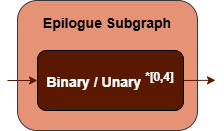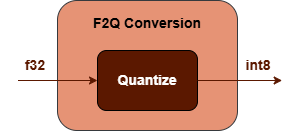Norm Fusion Patterns#
Overview#
The Norm category for inference includes operations such as: GroupNorm, LayerNorm and BatchNormInference.
oneDNN supports various Norm fusion patterns to optimize performance and reduce memory bandwidth requirements. This document describes the supported fusion patterns for Norm.
Pattern Structure#
oneDNN defines floating-point Norm fusion patterns as follows. The blue nodes are required when defining a Norm fusion pattern while the brown nodes are optional.

Norm Operation : Performs the corresponding norm operation for the
srctensor. See the GroupNorm, LayerNorm, BatchNormInference operations in the Graph API for more details.F2F Conversion Subgraph : Converts the output tensor from floating-point to another floating-point. It is constructed by a TypeCast operation.

Epilogue Subgraph : Optional and can include the following operations:
Binary and Unary operations: refer to the Note in Fusion Patterns.
Combination Rules:

N=20, 0 to 20 Binary or Unary operations are supported in the epilogue subgraph.
F2Q Conversion Subgraph : Converts the output tensor from floating-point to quantized data type. It can be one of the following subgraphs. It is constructed by a Quantize operation.

Data Types#
oneDNN supports the following combinations of data types for src and dst:
src |
dst |
|---|---|
bf16,f16,f32 |
u8,s8,bf16,f16,f32 |
The definition of data types and their support status on different CPU and GPU platforms follow the general description in the Data Types Guide.
Implementation Limitations#
BatchNormInference:
The Epilogue Subgraph only supports ReLU, and if present, can only appear once.
F2F and F2Q Conversion Subgraphs are not supported.
Implementation Notes#
Post-binary Add operations in the epilogue subgraph support in-place operations when the post-binary Add is the last operation in the epilogue subgraph and the dst output shape is identical and data type size is the same as the binary Add input. In case of an in-place operation, the original input data will be overwritten. Use in-place operations whenever possible for performance.
